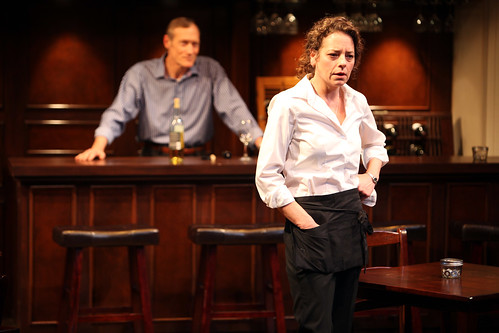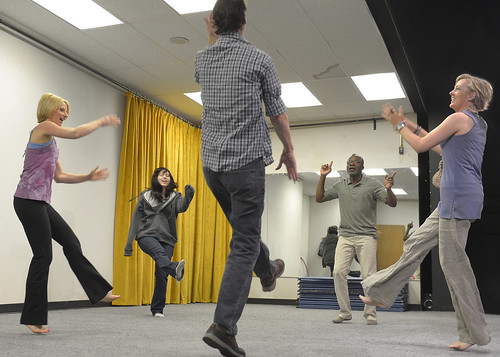
San Francisco playwright Christopher Chen (right) has won the Glickman Award for the best new play to have its world premiere in the Bay Area. His 2012 play The Hundred Flowers Project was a co-production of Crowded Fire and Playwrights Foundation and was directed by Desdemona Chiang (left). Photo by Pak Han
This being awards season, it’s nice to temper all the movie accolades with a homegrown theater award. The Glickman Award, presented each year to the best play that had its world premiere in the Bay Area, comes with a $4,000 cash prize and the honor of having your work set alongside other Glickman winners like Tony Kushner, Denis Johnson and Octavio Solis.
This year’s winner is Christopher Chen’s The Hundred Flowers Project, a co-production of Crowded Fire and Playwrights Foundation. The play, a wild, multimedia tale of theater making and revolution, was directed by Desdemona Chiang. (read my original review of the play here)
Honorable mention goes to adaptation of Josh Costello’s adaptation of Cory Doctorow’s Little Brother for Custom Made Theatre.
This year’s Glickman committee comprised critics Robert Avila (SF Bay Guardian), Karen D’Souza (San Jose Mercury News and the Bay Area News Group), Robert Hurwitt of the San Francisco Chronicle, Sam Hurwitt (The Idiolect and Theatre Bay Area) and yours truly.
Here’s a list of previous Glickman winners:
2012 The North Pool, Rajiv Joseph (TheatreWorks)
2011 Oedipus el Rey, Luis Alfaro (Magic)
2010 In the Next Room, Sarah Ruhl (Berkeley Rep)
2009 Beowulf, Jason Craig (Shotgun Players)
2008 Tings Dey Happen, Dan Hoyle (Marsh)
2007 Hunter Gatherers, Peter Sinn Nachtrieb (Killing My Lobster)
2006 The People’s Temple, Leigh Fondakowski (Berkeley Rep)
2005 Dog Act, Liz Duffy Adams (Shotgun)
2004 Soul of a Whore, Denis Johnson (Campo Santo)
2003 Five Flights, Adam Bock (Encore)
2002 Dominant Looking Males, Brighde Mullins (Thick Description)
2001 Everything’s Ducky, Bill Russell & Jeffrey Hatcher (TheatreWorks)
2000 The Trail of Her Inner Thigh, Erin Cressida Wilson (Campo Santo)
1999 Combat!, John Fisher (Rhino)
1998 Civil Sex, Brian Freeman (Marsh)
1997 Hurricane/Mauvais Temps, Anne Galjour (Berkeley Rep)
1996 Medea, the Musical, John Fisher (Sassy Mouth)
1995 Rush Limbaugh in Night School, Charlie Varon (Marsh)
1994 Santos & Santos, Octavio Solis (Thick Description)
1993 Heroes and Saints, Cherrie Moraga (Brava)
1992 Angels in America: Millennium Approaches, Tony Kushner (Eureka)
1991 Political Wife, Bill Talen (Life on the Water)
1990 Pick Up Ax, Anthony Clarvoe (Eureka)
1989 Yankee Dawg You Die, Philip Kan Gotanda (Berkeley Rep)
1988 Webster Street Blues, Warren Kubota (Asian American)
1987 Life of the Party, Doug Holsclaw (Rhino)
1986 Deer Rose, Tony Pelligrino (Theatre on the Square)
1985 The Couch, Lynne Kaufman (Magic)
1984 Private Scenes, Joel Homer (Magic)




